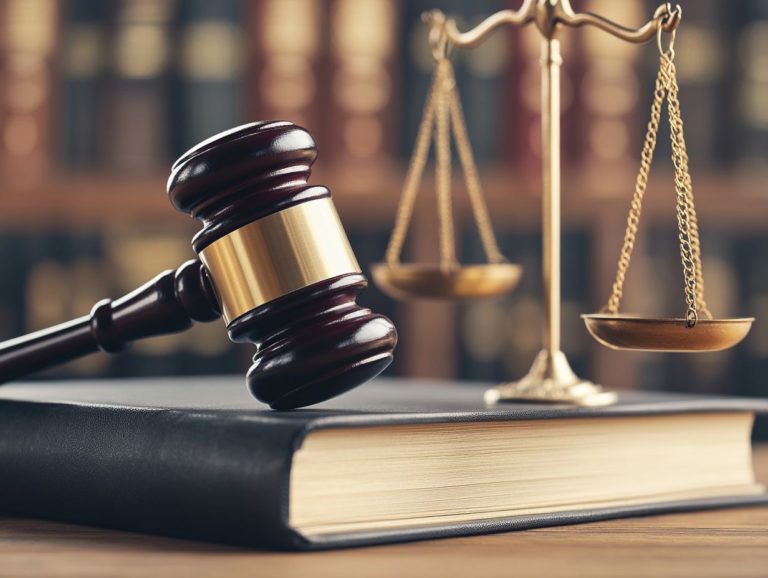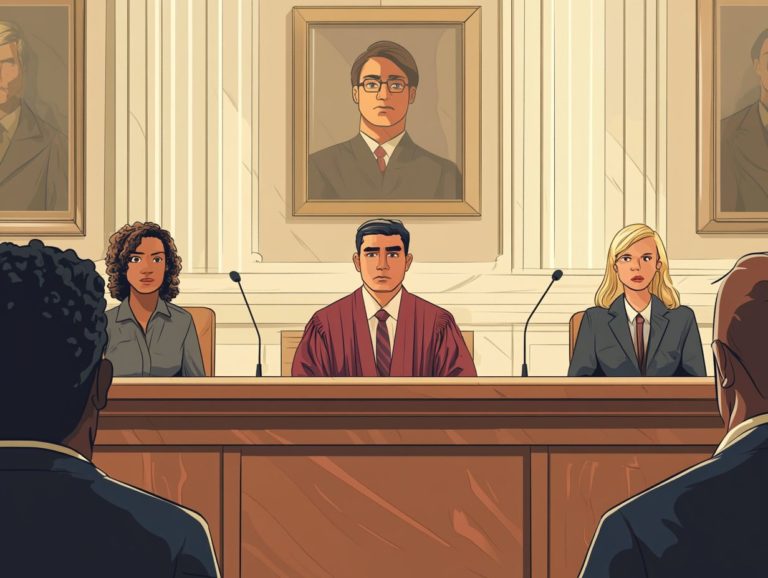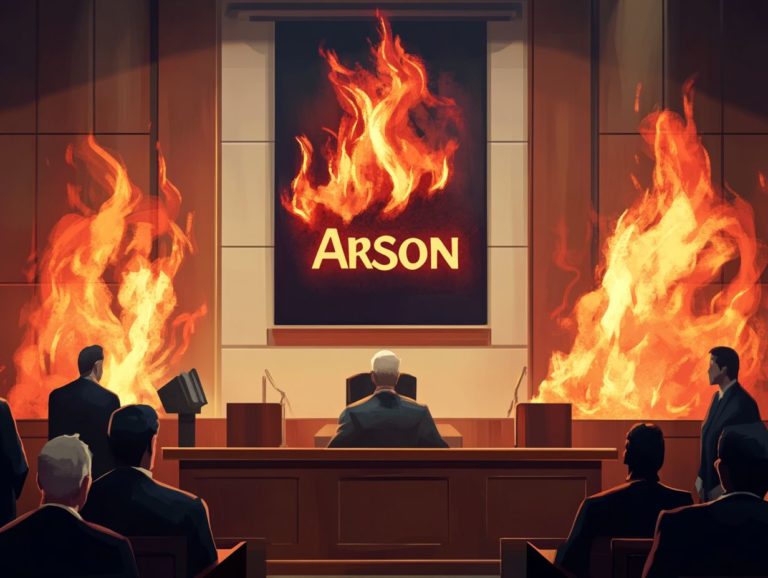The Impact of Drug Crimes on Society
Drug crimes present a significant challenge that impacts individuals and entire communities. It’s essential to understand what drug crimes are, as their implications reach far beyond legal definitions.
The consequences are extensive, affecting physical and mental health while also yielding broader social and economic repercussions. Let s explore the various dimensions of drug crimes, highlighting potential penalties for offenders and effective prevention strategies.
We will also discuss the need for support and rehabilitation for those affected. Engage with us as we uncover the profound impact of drug crimes on society.
Contents
- Key Takeaways:
- Overview of Drug Crimes
- Effects of Drug Crimes on Individuals
- Social and Economic Impact of Drug Crimes
- Legal Consequences of Drug Crimes
- Preventing Drug Crimes
- Addressing Drug Crimes in Society
- Frequently Asked Questions
- What are drug crimes and how do they impact society?
- How do drug crimes contribute to the spread of diseases?
- What is the economic impact of drug crimes on society?
- How do drug crimes impact families and communities?
- What efforts are being made to combat the impact of drug crimes on society?
- What Can Individuals Do to Help Address the Impact of Drug Crimes on Society?
Key Takeaways:

Drug crimes significantly impact individuals, leading to physical and mental health consequences that can have lasting effects. They also detrimentally affect society, resulting in high costs and negatively impacting communities. Effective prevention strategies and support for offenders are crucial in addressing drug crimes and promoting rehabilitation.
Overview of Drug Crimes
Drug crimes include many types of illegal activities tied to the use, distribution, and trafficking of illicit substances. This includes drug abuse, making methamphetamine, and using cocaine.
These offenses don t just impact individuals; they reverberate throughout communities and public health systems, often resulting in heightened healthcare costs and a strain on federal resources like those supplied by the National Drug Intelligence Center and the U.S. Department of Justice.
Understanding the implications of drug crimes is crucial for developing effective policies and interventions that address these pressing issues.
Defining Drug Crimes
Defining drug crimes requires an understanding of the complex web of illegal activities tied to drug abuse, including substance dependence and drug trafficking.
Drug abuse includes the harmful use of drugs that affect your brain and behavior, resulting in numerous health problems and social implications. This category includes various substances, from opioids like heroin and prescription painkillers to stimulants such as cocaine and methamphetamine, and even depressants like benzodiazepines.
On the other hand, drug trafficking involves the illegal trade of these substances, often organized into elaborate networks that facilitate the distribution of various illicit drugs across regions, posing significant threats to public safety.
Related offenses can include the manufacturing and distribution of controlled substances, which are regulated by law due to their high potential for abuse and addiction.
Effects of Drug Crimes on Individuals
The effects of drug crimes on individuals are profoundly devastating. They reveal themselves through health complications and psychological struggles, which may culminate in drug-related fatalities, childhood neglect, and a pressing need for addiction treatment.
These repercussions extend beyond the individual, sending shockwaves through families and communities, establishing a cycle of dependency and neglect that demands comprehensive intervention strategies.
Addressing these issues is essential for the overall well-being of society, especially given the alarming rise in drug abuse.
Physical and Mental Health Consequences
The physical and mental health consequences resulting from drug crimes can be severe, often leading to long-term health issues and psychological challenges for users.
For instance, individuals who use methamphetamine may encounter significant dental problems, skin conditions, and an increased risk of infectious diseases from sharing needles. In contrast, cocaine users often face cardiovascular issues, respiratory complications, and neurological disturbances that can lead to strokes or seizures.
Beyond these physical ailments, the psychological effects can be troubling, manifesting as anxiety, depression, and paranoia. Given these daunting challenges, access to specialized addiction treatment options, such as cognitive behavioral therapy and support groups, is essential!
These resources are vital! They can truly help individuals regain control of their lives and mitigate the harmful impacts of substance abuse.
Join us in making a difference! Support rehabilitation programs in your community!
Social and Economic Impact of Drug Crimes

The social and economic impact of drug crimes is significant. These crimes impose considerable burdens on communities, diminish workplace productivity, and drive up healthcare costs associated with addiction treatment and drug-related health issues. For deeper insight, consider exploring the connection between drugs and crime.
The repercussions extend beyond individual users, affecting families and societal structures. There is even environmental damage linked to illicit drug production and trafficking.
It s essential to consider these factors during policy-making to effectively tackle the complex challenges related to drug-related issues.
Costs to Society and Communities
The costs to society and communities from drug crimes manifest in various ways, including economic burdens and healthcare expenses. These costs go beyond financial losses and include negative effects on society and the economy that hinder growth and stability.
For instance, a 2018 report indicated that drug misuse and related crimes accounted for nearly $740 billion annually in the United States. This staggering figure combines lost productivity, healthcare costs, and expenses linked to the criminal justice system.
Hospitals often grapple with increased patient volumes due to drug overdoses, putting additional strain on already limited healthcare resources. Communities face heightened policing demands, leading to a significant decline in neighborhood safety. This atmosphere of fear discourages investment and weakens community ties, ultimately resulting in long-term decline.
Legal Consequences of Drug Crimes
The legal consequences of drug crimes can be serious. Potential penalties differ significantly based on the type and quantity of illicit drugs involved, as well as the specifics of the situation, including any prior criminal history.
Sentencing typically falls under the purview of the criminal justice system, which may use drug courts as an alternative to traditional sentencing. These courts prioritize rehabilitation over incarceration, creating a more balanced approach.
Understanding these laws helps you deal with drug offenses fairly.
Potential Penalties and Sentencing
Potential penalties for drug crimes can vary widely, shaped by factors such as the substance involved and your prior offenses. This broad spectrum of consequences means that if you re charged with possession of a small amount of marijuana in one state, you might only face a modest fine.
In contrast, being caught with the same amount in another jurisdiction could lead to more severe consequences, possibly including jail time. Graver charges like trafficking or distribution carry even higher stakes.
The classification of the drug whether a misdemeanor or felony along with the quantity involved, can dramatically increase the penalties faced.
Navigating these complex sentencing guidelines can feel overwhelming, as judges often have the discretion to consider various factors. This reality highlights the stark disparities in how drug offenses are treated across different legal landscapes.
Preventing Drug Crimes
Preventing drug crimes demands a comprehensive strategy. This strategy should combine effective prevention methods, public health initiatives, and the strategic allocation of federal resources aimed at addressing the root causes of drug abuse.
This holistic approach should prioritize community engagement and enhance access to treatment facilities. It s crucial to act now to prevent drug crimes and protect our communities.
Join the fight against drug crimes by supporting local initiatives!
Effective Prevention Strategies

Preventing drug crimes requires a mix of public health initiatives and education. Easy access to treatment facilities is also crucial.
By nurturing community programs that promote healthy lifestyles and offer resources for those at risk, you can take a proactive approach to tackle drug-related challenges.
For example, educational campaigns aimed at schools have shown remarkable success in raising awareness among young people about the dangers of substance abuse.
Successful initiatives, such as community support groups and local rehabilitation centers, ensure that individuals struggling with addiction receive the necessary assistance.
When treatment facilities are easy to find, more people can get help. This not only reduces stigma but also helps create safer, healthier communities!
Addressing Drug Crimes in Society
Addressing drug crimes in society requires a keen focus on support and rehabilitation. Programs like drug courts, which are special courts that help people recover from drug addiction instead of just punishing them, are essential.
By leveraging federal resources and cultivating strong community partnerships, you can help establish effective addiction treatment frameworks that meet the needs of offenders and foster healthier communities for everyone.
Support and Rehabilitation for Offenders
Support and rehabilitation for offenders are crucial in tackling drug crimes. They highlight the importance of addiction treatment and the pivotal role of drug courts in promoting recovery.
These systems pave the way for healing and significantly reduce the chances of recidivism by guiding individuals through their recovery journey.
Various rehabilitation programs offer tailored counseling, medical support, and life skills training, addressing the unique challenges faced by those struggling with addiction.
Drug courts prioritize treatment over punishment, ensuring access to vital resources and professional assistance.
When individuals receive structured support, including ongoing therapy and community engagement, their potential for lasting recovery increases dramatically, creating an environment filled with hope and renewal.
Frequently Asked Questions
-
What are drug crimes and how do they impact society?
Drug crimes refer to illegal activities involving the possession, use, manufacturing, and distribution of controlled substances. These crimes can have devastating effects on society, leading to increased violence, health problems, and strain on the criminal justice system.
-
How do drug crimes contribute to the spread of diseases?
Drug use often involves sharing contaminated needles or engaging in risky behaviors. This can lead to the spread of diseases such as HIV/AIDS and hepatitis, affecting individuals and putting the entire community at risk.
-
What is the economic impact of drug crimes on society?
The economic impact of drug crimes is significant. It involves costs associated with healthcare, criminal justice, and lost productivity due to addiction or incarceration. This not only affects the overall economy but can also lead to job loss and a decrease in property values.
-
How do drug crimes impact families and communities?
Drug crimes can tear families apart. Addiction and incarceration lead to broken relationships and financial strain, creating a sense of fear and insecurity in communities due to drug-related violence.
-
What efforts are being made to combat the impact of drug crimes on society?
Governments and organizations are implementing various strategies to combat drug crimes. These include increased funding for prevention and treatment programs, stricter penalties for drug offenses, and community outreach and education initiatives.
Join community initiatives today to help combat drug crimes and support those in need!
What Can Individuals Do to Help Address the Impact of Drug Crimes on Society?
Everyone can make a difference by learning about the dangers of drug use. Share this knowledge with others to raise awareness.
Reach out to those struggling with addiction. Offer support and guide them to resources for treatment and recovery!






